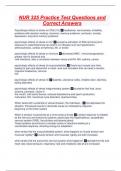Exam (elaborations)
NUR 325 Practice Test Questions and Correct Answers
- Course
- Institution
Psychologic effects of stress on CNS (10) headaches, nervousness, irritability, problems with decision making, insomnia, memory problems, confusion, anxiety, depression, long term memory problems psychologic effects of stress on CV excessive activation of SNS and long term exposure to catecholamin...
[Show more]



